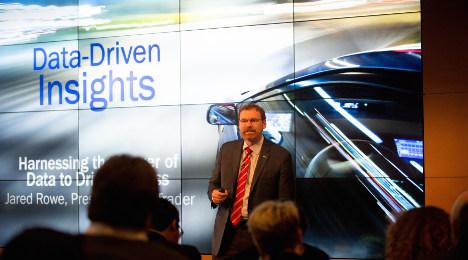You know more about online customers than you think

Cox Automotive Media Division president Jared Rowe during the Haystak Digital Summit at Google earlier this year. Photo credit: Haystak Digital Marketing.
By subscribing, you agree to receive communications from Auto Remarketing and our partners in accordance with our Privacy Policy. We may share your information with select partners and sponsors who may contact you about their products and services. You may unsubscribe at any time.
CARY, N.C. –
The online marketplace billing itself as the “first startup to take on, and successfully disrupt the pre-owned industry” has moved into the Washington, D.C. metro area. That company is Beepi, a car-buying and -selling tool that is expanding across the country and is now in 13 markets. But the peer-to-peer marketplace also has, well, peers.
Vroom, an online direct-to-consumer used-car retailer, announced Wednesday it is planning to open a “reconditioning and fulfillment center” in Indiana in December, which will be its second such facility. And Thursday, Shift revealed its iPhone app where consumers can “assess and sell cars based on market pricing and conditions.”
Online hubs like these and even a carmaker like Tesla, which has expanded into the certified pre-owned market, appear to have their sights set on similar targets: generally speaking, an online, direct-to-consumer method of selling used cars.
However, one might argue that the larger and perhaps more important trend goes beyond the increasing footprint of the direct-to-consumer online model. Consider the overall investment in the digitization of the used-car market, both by the industry and dealers themselves — as well as by so-called disrupters.
That includes everything from capital investments in startups (like the $54 million equity funding Vroom announced in July) to the investments in technology platforms specific to pre-owned and tech-savvy standalone used-car outlets from major dealer groups.
The increased digital focus on used cars runs from well-established players like Cars.com — whose Sell & Trade program allows consumers to transition out of their ride in the manner they see fit, while also generating used inventory for dealers — to relative newcomers like CarStory, whose InLine CarStory Market Reports embed vehicle research directly into the VDP to keep the customer engaged longer on the dealer website.
Subscribe to Auto Remarketing to stay informed and stay ahead.
By subscribing, you agree to receive communications from Auto Remarketing and our partners in accordance with our Privacy Policy. We may share your information with select partners and sponsors who may contact you about their products and services. You may unsubscribe at any time.
So, how can dealers take advantage of the fact that within the used-car environment, more of the research, shopping and even purchasing processes are being taken care of digitally?
That’s one question Auto Remarketing posed to Cox Automotive Media Division president Jared Rowe in a recent interview.
“One thing is that in the digital environment, we’re able to learn more about consumers and about what they want than we’ve ever had before,” Rowe said. “So, we know more about what consumers really want. We just have to be willing to tailor the in-dealership experience, and be willing to tailor how we handle these consumers to what they’re asking for.”
Knowing more about these shoppers gives the industry more information about how it can conduct more efficient customer management and get as much value from the transaction as possible, he said.
“This isn’t just about the sale,” Rowe said. “This is about building a relationship that will stand the test of time because we all know that our best customers are the customers that come back to us.”
Next, he said, it’s about maximizing the resources available to you.
“The second thing is, we have more tools available to us to digitize elements of the transaction than ever before,” Rowe said. “So, when we think about what consumers have told us about, say, finance and how they’d like the finance process to begin online, and they’d like to really start to tailor the negotiation basically to their terms, and how they start to interact with the dealer, the interesting thing in my mind is we have more tools as an industry available to us than ever before to connect with consumers in this way and not give up what we value most.
“Because ultimately, the big shift that I see occurring here is that simply trying to control the consumer through this process is becoming increasingly difficult,” he added. “But if we’re able to connect with them in the way that they want to be connected with and give them tools so that they can find the inventory that they want, they understand what pricing looks like relative to the market and relative to them.
“They understand what their financing options are – and not just the loan, but also the other products and services in F&I, because those are intensely valuable, and consumers tell us that they’re valuable … so introducing them to consumers upfront feels awkward and feels a little different for us as an industry because so much of our sales process has been predicated on control, but by meeting the consumer where they want to be met, we actually gain control and we gain control through trust,” Rowe said.
“And if trust is too squishy of a word for folks to even feel good about, then actually we gain control through shared context,” he said. “Because we won’t have this information disadvantage on either side, and that’s ultimately what we see consumers wanting to do – is to not have an information disadvantage, and the way we can go about solving this is actually doing it in a way where we can promote the products and services that are valuable to us.”


